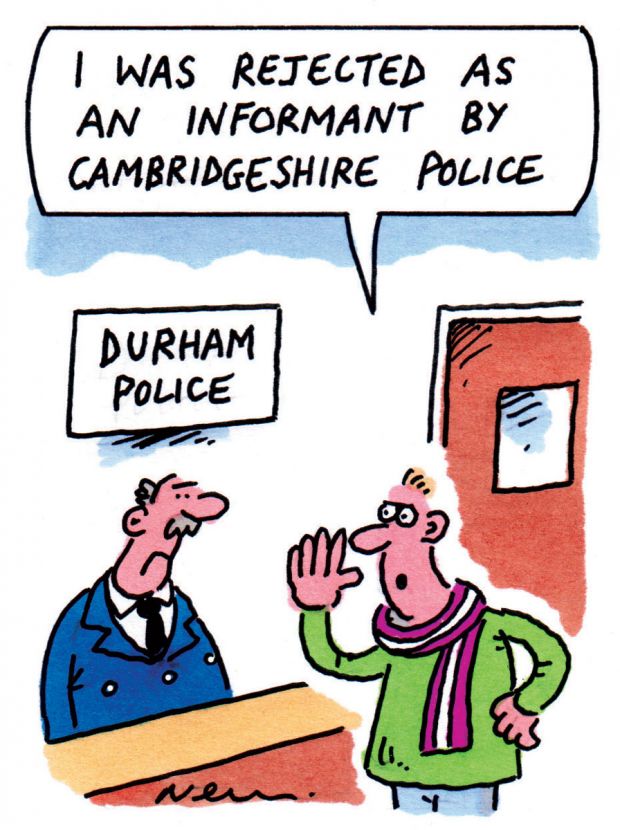
- The University of Cambridge has long been a recruiting base for would-be spies, but now it seems that it is students themselves who are the focus of espionage efforts, The Guardian reported on 15 November. A Cambridgeshire police officer was recorded trying to persuade an activist to become an informant and feed him intelligence about student protesters, the paper says. The officer asks the man to target “student-union type stuff” because “the things they discuss can have an impact on community issues”; the anti-fees group Cambridge Defend Education might also be of interest. But just how much impact has any recent students’ union activity had on the local Cambridge community? Its last notable action was the 2010 occupation of Senate House, in which some of the politest protesters even held a whip-round to pay for the replacement of an accidentally broken window.
- Plans to raise a statue to stop traffic cones being placed on its head have been withdrawn after a campaign led by a University of Glasgow academic. An online petition organised by Donna Yates, a Leverhulme early career fellow at Glasgow’s Scottish Centre for Crime and Justice Research, says that the cone on the Duke of Wellington monument has become part of the city’s landscape. It has gained more than 10,000 signatures, and a “save the cone” Facebook site garnered 45,000 likes. Such support prompted the council to scrap plans to spend £65,000 elevating the plinth outside the Gallery of Modern Art, The Guardian reported on 13 November. With the drunken student antics now officially part of civic life, perhaps cone-placing will finally begin to lose its allure.
- Malcolm Gillies’ tenure as vice-chancellor of London Metropolitan University will end next year. The Australian, who has led the embattled institution for nearly four years, will leave in 12 months, it was announced on 15 November. Professor Gillies arrived at London Met in 2010 in the aftermath of the controversy over student-completion data, but his time there has proved equally eventful. He oversaw the abolition of two-thirds of its courses, and the university was rocked when it was stripped of its licence to teach international students in August 2012, although it won it back earlier this year. London Met said that Professor Gillies’ retirement was “timed carefully to support the development of the next stage of the university’s strategic plan”.
- The Catholic university where The Exorcist was set is again beset by demons, according to the Oscar-winning screenwriter and author of the classic horror story, The Times reported on 16 November. Outraged by the sexually permissive culture at Georgetown University in Washington DC, William Peter Blatty has submitted to Pope Francis a petition with more than 2,000 signatures that calls on the pontiff to strip the institution of its Catholic credentials unless it complies with Church teachings, the paper reported. The Georgetown alumnus, who learned of the exorcism that inspired the 1973 film in an undergraduate lecture, claims that his alma mater is now more interested in being “cool” than Catholic. As evidence of Georgetown’s fall, he cites the distribution of condoms on campus and stories about “hook-up sites” in the university-funded newspaper. Its “surrender to abortion politics” arouses more wrath, with Mr Blatty condemning the “demonic horror” of the “crime of infanticide”. Georgetown, which Jesuits founded in 1789, defended itself by highlighting the seven Catholic Masses held each Sunday on campus and the mandatory theology classes taken by its students.
- To rub salt in the wounds of the disbanded 1994 Group, the Russell Group this week was given its own category in employment statistics. On 19 November the Office for National Statistics published a comparison of the employment prospects of those who attended institutions in the group with those who did not. Graduates in the UK Labour Market 2013 refers to the Russell Group representing the “top UK universities” and found that its graduates earned more per hour and were more likely to have highly skilled jobs than graduates from the rest of the sector. The ONS attributes this to higher entry standards and more of its students in high-earning fields.
Register to continue
Why register?
- Registration is free and only takes a moment
- Once registered, you can read 3 articles a month
- Sign up for our newsletter
Subscribe
Or subscribe for unlimited access to:
- Unlimited access to news, views, insights & reviews
- Digital editions
- Digital access to THE’s university and college rankings analysis
Already registered or a current subscriber? Login